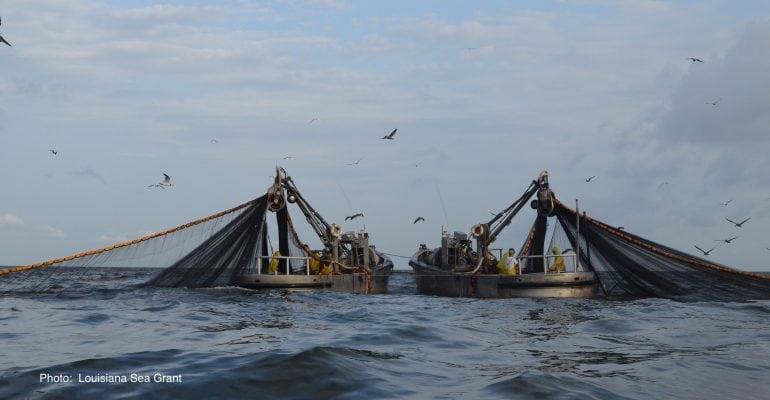At the July Louisiana Wildlife and Fisheries Commission meeting, LGL Ecological Research Associates presented the results of a comprehensive commercial Menhaden fishery bycatch study. The Louisiana Legislature directed LDWF to spend up to $1M of the Artificial Reef Fund for an up-to-date, statistically sound bycatch study utilizing modern methods to characterize the bycatch in the Menhaden fishery off the Louisiana coast. The Gulf States Marine Fisheries Commission (GSMFC) utilized a Request for Proposal (RFP) process and awarded the contract to LGL Ecological Research Associates.
Below are a few key results, along with a link to the LGL presentation and the full report:
- Mortality estimates for Red Drum (in numbers) are not significantly different from those previously estimated by LDWF; however, the LGL study provided average weights of Red Drum from the bycatch, which were not previously available. These weights, physically taken from the bycatch, resulted in a higher total poundage of dead Red Drum, despite the total numbers being very similar to previous LDWF estimates.
- Mortality estimates of Spotted Seatrout are higher than previously estimated by LDWF, as the LGL study does a more effective job of accounting for retained catch, which was not accounted for well in previous bycatch work upon which previous LDWF estimates were based.
- Despite the larger poundage of both Red Drum and Spotted Seatrout in menhaden bycatch, the stock status and length of time for stocks to approach management targets are likely to remain unchanged; however, the characterization and proportion of removals will change within the assessment.
- Estimates of total bycatch, for all species combined, remain below the 5% threshold established in state law and are approximately 3.6% by weight.
- The most abundant species in the retained catch are Atlantic Croaker, Sand Seatrout, Spot, White Shrimp, Hardhead Catfish, and Gafftopsail Catfish. Those six species accounted for 89% of the retained catch.
- The most abundant species in the released bycatch were Red Drum, Black Drum, Gafftopsail Catfish, and Blacktip Sharks.
- This report will enable LDWF to model bycatch mortality from the menhaden fleet in all future stock assessments for all stock assessment species.
- Utilizing results of the LGL bycatch study for comparisons of fishery removals, by weight, of Red Drum in Louisiana waters from 2015-2024, dead bycatch from the menhaden fishery accounted for 9.9% of the total fishery removals while the directed fishery accounted for 90.1% of the total fishery removals (recreational harvest=78.9%, recreational dead discards=11.2%).
- Utilizing the results of the LGL bycatch study for comparisons of fishery removals, by weight, of Spotted Seatrout in Louisiana waters from 2015-2024, dead bycatch from the menhaden fishery accounted for 2.7% of the total fishery removals while the directed fisheries accounted for 97.3% of the total fishery removals (recreational harvest=93.3%, recreational dead discards=3.9%, commercial harvest=0.1%).
LGL Ecological Research Associates Bycatch Estimation Report
LGL Ecological Research Associates Characterization of Released Bycatch Survival




